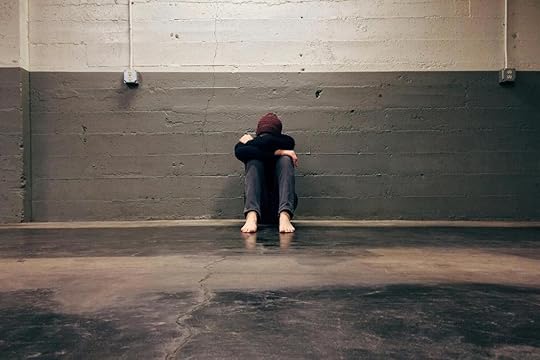I’m a Christian with Generalized Anxiety Disorder.
 Photo courtesy of Pexels
Photo courtesy of PexelsI’m a Christian, but when I was nine I had my first panic attack.
I cried myself to sleep because I was afraid of change. Because the idea of dying scared me. Because heaven sounded boring, and eternity sounded terrifying.
When I was thirteen, I was terrified of throwing up. The terror would give me a stomachache, which made the terror worse. I put so much pressure on myself because I never felt like I was achieving enough, doing enough, being enough. (I’m a perfectionist. Can anyone relate?)
When I was sixteen, there were some nights I simply could not stop crying. Crying because I wasn’t good enough. Because I felt like my life was over, that I’d never be enough, do enough, achieve enough.
When I was nineteen, I lost 15 pounds in 3 months because I booked myself solid in college with no time to breathe, only time to panic and cry (but not to eat). I was an anxious ball of energy, every hour of the day. (Y’know, that whole perfectionist thing.)
All of those Audreys followed me into my 20s, even as the turbulent teenage years calmed down and I settled into myself. The telltale ghost of anxiety followed me. The stomach aches. The what-ifs. The endless cycles of worry. The inability to deal with any kind of uncertainty (COVID was certainly a fun time.)
Sometimes the anxiety was easy to ignore. Sometimes it wasn’t. But what it always was was something to fix or ignore or be ashamed of.
I shouldn’t be feeling this way. Everything in my life is so good.
I shouldn’t be feeling this way. It’s a burden to other people.
I shouldn’t be feeling this way. Think happy thoughts!
When I was twenty-eight going on twenty-nine, I woke up out of a dead sleep with my heart racing, my limbs locked up, nauseated, trembling. Something was wrong—but what? My brain decided to try to figure it out. We’re dying. We’re going crazy. We’re dying and going crazy.
“It just came out of nowhere,” I would tell people later on, including my counselor.
“But it really didn’t,” my counselor replied. And she was right.
It had been a long winter of no sunlight, little social interaction, and two viral illnesses. I was trying to navigate that dead of Michigan winter while recovering from back-to-back viral infections, isolated by snow and ice, constantly worrying about my health, constantly not feeling like myself. Feeling unmoored. Feeling chaotic.
Until I wasn’t able to fix or ignore it anymore and my body gave me a panic attack.
A panic attack that sent me to a psychiatrist because I legitimately thought I was losing my mind.
Since then, there has been no magic pill, no magic word, no “do this to stimulate your vagus nerve” to make me okay (as much as I wanted there to be one.)
I can’t fix it. I can’t ignore it. But I don’t have to be ashamed of it, either.
El Roi. You are the God who sees me.
When He sees me, He sees my anxiety, too. He sees every “what if” thought. He sees every fear. No thought is hidden from Him.
Panic attacks are basically huge rushes of adrenaline that set your body into fight-or-flight mode. They serve a purpose—they activate you to get ready to face the enemy or run away as fast as you can. But when there’s no real threat and your adrenaline rushes, your brain will come up with a reason for something to be wrong. It needs to make sense of what’s going on. The frontal lobe (the very rational part of your brain) shuts off. The amygdala (the “threat” response part of your brain) goes nuts, like a smoke alarm that needs new batteries.
Panic attacks can feel so visceral and life-threatening that a lot of people think they’re having a heart attack and go to the hospital. I was convinced I was on the brink of death.
With that rush of adrenaline came a long week of insomnia—getting maybe three hours of sleep a night. Those nights were full of prayers.
“God, just a little more sleep.”
“God, why?”
“God, how long?”
“God, are you there?”
“Help me.”
A few weeks after that panic attack, as I struggled with reactivated, resensitized anxiety I hadn’t felt in years, I walked through a cold parking lot toward my car and heard a voice:
“I’m with you. I’ve always been with you.”
I wept in my car on the way home, realizing that God was saying He’d been with me during that panic attack. He’d been with me on that week of sleepless nights when adrenaline kept me awake, too afraid to close my eyes. He formed my mind. He told me to trust Him with it.
Sometimes when we’re in a crisis, we don’t need someone to say the perfect thing to us. We just need them to be with us, to share the same space as us. When I was crying out to God in the middle of the night, I wanted to hear something.
I didn’t realize He was simply there with me, sitting with me as I trembled and cried and looked out the window onto the sleeping street.
Is trusting Him easy? No. Did He make it 100% okay after that? No.
I’m still not okay. (At the time of writing this, it’s only been about two months since that panic attack.)
But He sees me. And He sits with me. I know that now when I wake up in the middle of the night, unable to sleep.
If I go up to the heavens, you are there. If I make my bed in the depths, you are there.
I’m a Christian with Generalized Anxiety Disorder (GAD). Almost 7 million adults in the US suffer from GAD. GAD is characterized by excessive worry and the inability to control it. It manifests in physical symptoms—restlessness, inability to relax, digestive issues, heart palpitations, brain fog. Some say it’s a chemical imbalance, others say it’s situational—it doesn’t matter. It’s real.
I got physical help for my anxiety. The night of my panic attack, I asked God to help me. In the morning, my mom texted me about a local psychiatry office. God helped me through that referral. I work with a counselor. I work with a psychiatrist. Help is available, and Christians with GAD shouldn’t feel like they can only pray about it or trust God harder.
It’s not helpful that every online influencer (and sometimes, well-meaning friend) has a “fix” for it. Just tap your face. Just take a cold shower. Just drink this special tea. Just sleep better. Just pray about it.
All of those things work until they don’t. (I do love my chamomile tea and weighted blanket, though.)
What I’ve learned and am still learning (because I’m still highly anxious as I type this) is that most anxiety simply needs to be tolerated. If it’s “fixed,” it comes back. If it’s ignored, it comes back (worse). But if it’s tolerated, it becomes a channel in your brain that occasionally flips on, but doesn’t interrupt regularly scheduled broadcasting. (You know, like how most people handle every day, run-of-the-mill, non-disordered anxious thoughts.)
What I’ve learned and am still learning is that I cannot tolerate my anxiety without Christ.
Because in order to tolerate anxiety, you have to acknowledge it. And that’s scary. If you stare directly at a “what if” thought, it’s tempting to follow it. To listen to what it tells you to do (for me, it tells me to Google “why do I have a headache” and then plan my own funeral). If you stare directly at a fear, it’s easy to let it take you over like a wave.
But if I stand beside someone who conquered death, who finished the work, I can tolerate it. Even if He has to hold me. Even if I’m weeping and trembling.
I’m with you. I have always been with you.
The finished work means I don’t have to fix it and I don’t have to ignore it. The finished work doesn’t mean it will magically go away. But the finished work means I have hope in my despair. Because He saw my anxious heart, He saw my fearful thoughts, and He died for me anyway.
The anxiety is still there. I feel it now. It’s risen and fallen in me all day. It’s whispered secret fears to me. It’s made me lose my attention, made me feel uneasy, even made me despair.
The anxiety doesn’t get the last word on me, or on any Christian who suffers with GAD (or OCD, or bipolar, or schizophrenia, or any other unseen mental affliction that Christians don’t like to talk about.) It feels total. It feels world-shattering. It even feels world-ending.
The cross stands between me and my anxiety. It says, “She is mine. She is loved.”
The anxiety is still there, but so is the Christ who had the final word.
a.d.b.



